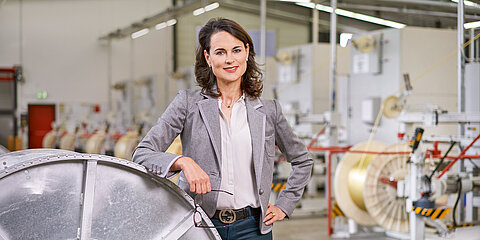Coroplast Global | Insights We take responsibility – sustainable measures in our product development

Our understanding Two criteria for "sustainable products"
- We speak of "sustainable" when our technical adhesive tapes, cables and wires are more resource-efficient than other solutions due to their design or manufacturing process, have a lower carbon footprint or bring other ecological and social benefits.
- Products also meet this requirement if their properties are ideally suited for applications in certain sustainable markets that contribute to decarbonization – such as renewable energies or emission-free mobility.
In line with these criteria, we continuously try to identify sustainability potential in the product ranges of our divisions and implement it step by step.
Sustainable product developments from our divisions
Coroplast Tape
Linerless solution for the construction industry
As a specialist in technical adhesive tapes, we offer Coroplast 1411 RPX, a grid-reinforced film adhesive tape that is used in the construction sector for airtight sealing of roof beams, pipes and cables. Due to the strong adhesive, such tapes are usually equipped with a liner. This means that the adhesive surface is covered with a film or siliconized paper, which is removed before processing.
This is where our sustainable development comes into application: We developed our Coroplast 1411 RPX in a way, that it does not require a liner anymore. On the one hand, this helps us to avoid waste on construction sites – and on the other, the product can be processed even faster. As with many of our adhesive tapes, we additionally use a solvent-free adhesive for our new, sustainable film adhesive tape.
Sustainable automotive cable wrapping tapes
We have developed the Coroplast ST series especially for sustainability in the automotive sector. The various cable wrapping tapes in this series are used for abrasion protection or noise damping, and the carrier is now made of PET recyclate. Compared to other cable protection systems, our adhesive tapes save volume and weight during transportation, storage and in the installation space. The entire Coroplast ST series also uses solvent-free adhesives.

Coroflex
As with Coroplast Tape, many sustainable innovations in the Coroflex division start with product design. Here, our developers pursue the goal of making our cables and wires more resource-efficient and more recyclable or even lighter in terms of the circular economy.
Use of recycled raw materials
For example, we have our own facilities to regranulate our plastic waste. This enables us to actively reduce waste and return our high-quality materials to the production process. In addition, we use up to 40% recycled copper for the products from our European plants.
Saving and replacement of materials
By using sophisticated technologies, we have succeeded in reducing the number of materials required or the overall amount of material used for many cables and wires. We are also working on an alternative for the material TPU (thermoplastic polyurethane), which we use in cable extrusion or cable production.
We are gradually replacing fossil fuels with renewable raw materials in our products. When developing bio-based solutions, it is important to us that we avoid raw materials that are obtained from foodstuffs such as maize. In this way, we are helping to ensure that valuable arable land is preserved for food security.
Talc and PCB-free production
We largely avoid the use of talcum powder and PCBs during production in order to reduce air pollution and the need to clean the machines. This protects the environment - and the health of all employees who work with our cable solutions.
Drivers of electromobility
Coroflex also plays an important role in our second criterion – the use of products in sustainable markets: for example with high-voltage cables or charging cables for electromobility.

WeWire
In the WeWire division, the development department too, is the origin for our sustainability measures. Here we rely on the use of regranulate to avoid waste and promote the circular economy. We also focus on reducing the amount of material used in our cables and wires.
Sustainability without loss of quality
In regranulation, recycled plastics are processed into granulate. Plastics are cleaned, shredded and formed into small granules, which can then be used to manufacture new products such as plastic holders, cable guides, grommets and connector housings. Which plastics can be used with which recycled content depends on who’s requirements the end product needs to meet. The challenge here is that the material properties can not degrade, even with recyclate, in order to meet the high quality standards of the mobility sector.
In addition to the regranulates, which we purchase directly from the manufacturer as a finished mixture, WeWire also collects waste directly from the production process, grinds it in special grinders and feeds it back into the process.
Weight optimization and reduction of production waste
When developing new products, we also aim to use as little material as technically possible. For example, housings and other plastic parts are designed to be weight-optimized. We are increasingly using hot runner technology for tools, which ensures that no sprue residues are produced during production that then have to be processed and fed in later.

Coroplast Group – Electricity from renewable energy sources
In 2020, we switched the production of all business units at the Wuppertal site to green electricity. We are currently reviewing the extent to which this measure can also be implemented at our international locations. At our site in China, we have already made progress in terms of sustainable energy supply. A further step on the way to greenhouse gas neutrality – and an important measure to meet the growing demand for "sustainable" products.
Find out more about the Coroplast Group's sustainability strategy

Your contact Sustainability – Social and Governance



